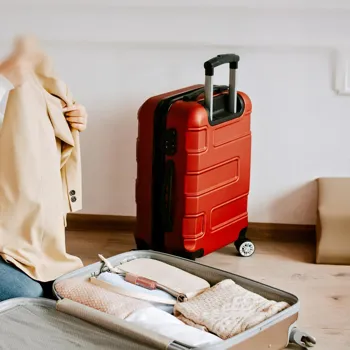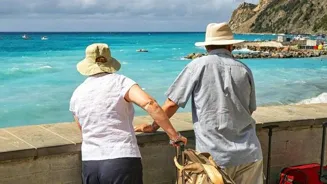Embark on a delightful journey with senior loved ones. 8 tips for a smooth trip. Read more for a memorable experience
Traveling is a wonderful experience, opening up avenues for exploration, relaxation,
and making lasting memories. But when accompanying senior citizens, a little extra planning and tweaking the itinerary can go a long way in ensuring a smooth and enjoyable trip for everyone.
After all, their comfort and well-being are paramount. So, before you pack your bags and book those tickets, consider these eight handy tips to make your senior's travel experience delightful.
Pre-Trip Doctor's Consultation: A Must-Do
Imagine embarking on a long-awaited trip only to discover halfway that your senior companion's medication is running low or a pre-existing condition is acting up. To avoid such scenarios, a pre-trip consultation with their doctor is absolutely crucial.
The doctor can assess their overall health, provide necessary vaccinations or booster shots relevant to the destination, and offer advice on managing any existing health concerns during the journey.
They can also prescribe medications for common travel ailments like motion sickness or upset stomachs. Don't forget to carry a copy of their medical history and a list of all current medications, including dosages, both in physical and digital formats.
This information will prove invaluable in case of any unforeseen medical emergencies. This proactive step ensures everyone feels secure and prepared throughout the adventure. Remember, being well-prepared medically is the best way to avert medical emergencies during the trip.
Smart Packing: Lightweight and Organized is Key
Packing for seniors requires a different approach than packing for younger travelers. Prioritize lightweight luggage with wheels and comfortable handles, making it easy for them to maneuver through airports and hotels.

Help them pack only essential clothing items, keeping in mind the weather conditions at the destination. Comfortable walking shoes are a must! Regarding medication, pack a sufficient supply to last the entire trip, plus a few extra days, just in case of delays.
Separate the pills in a pill organizer by day and time. Also, include items that provide comfort, such as a travel pillow, a warm shawl or cardigan, and their favorite books or magazines.
Don't underestimate the power of familiar items in creating a sense of security for your senior companion in an unfamiliar environment. And, most importantly, ensure all essential items are easily accessible in a carry-on bag, rather than buried deep within checked luggage.
Travel Insurance: Peace of Mind is Priceless
Travel insurance is a necessity for all travelers, but it's especially important when traveling with senior citizens. Choose a comprehensive policy that covers medical expenses, trip cancellations, lost or delayed baggage, and personal liability.
Carefully review the policy details to ensure it adequately covers any pre-existing medical conditions your senior companion may have. Make sure it covers hospitalization, emergency medical evacuation, and repatriation, if necessary.
Consider purchasing coverage specifically designed for senior travelers, as these policies often offer additional benefits and higher coverage limits.
While nobody likes to think about things going wrong, travel insurance offers invaluable peace of mind, knowing that you're financially protected in case of unexpected events. Be sure to keep the policy details easily accessible throughout the trip.
Choose Accommodations Wisely: Comfort and Accessibility Matter
When booking accommodations, prioritize comfort and accessibility. Look for hotels or guesthouses with accessible rooms, featuring features like grab bars in the bathrooms, roll-in showers (if needed), and ramps instead of stairs.
Ground-floor rooms are preferable, especially if elevators are not readily available or reliable. Inquire about the availability of amenities tailored to seniors, such as comfortable seating areas, reading corners, and quiet spaces for relaxation.
Consider proximity to essential services like pharmacies, hospitals, and restaurants. Pay attention to the hotel's noise levels; choose a room away from busy streets or noisy elevators to ensure a peaceful night's sleep.
Simple things like a good bed and adjustable lighting can make a big difference. Ensure that the accommodation has air conditioning or proper ventilation to maintain a comfortable temperature.
Pace Yourself: Slow and Steady Wins the Race
Remember that seniors may not be able to keep up with the same pace as younger travelers. Plan your itinerary with plenty of downtime and avoid cramming too many activities into one day. Schedule regular breaks throughout the day for rest and relaxation.

Allow for extra time to get from one place to another. Don't overestimate their physical capabilities; be realistic about what they can comfortably manage. Instead of rushing through sightseeing destinations, prioritize quality over quantity.
Focus on experiencing a few key attractions at a relaxed pace, rather than trying to see everything. Be mindful of their needs and don't push them beyond their limits. This way the whole trip is fun and stress free.
Transportation Tips: Smooth and Stress-Free Transfers
Navigating airports, train stations, and public transportation can be particularly challenging for seniors. Request wheelchair assistance or escort services at the airport to help them get around easily. Book direct flights whenever possible to minimize layovers and potential delays.

Consider pre-booking airport transfers or hiring private transportation to avoid the stress of navigating public transport upon arrival. If using public transportation, opt for routes with elevators or escalators. Allow extra time for boarding and disembarking.
When traveling by car, plan regular stops for stretching and restroom breaks. If someone in the family has a car ensure it is accessible for someone. Avoid overspeeding or taking sharp turnings to avoid uncomfortable situations.
Dietary Considerations: Healthy and Hydrated is the Mantra
Maintaining a healthy diet and staying adequately hydrated is crucial for seniors, especially during travel. Plan meals in advance and choose restaurants that offer healthy options and cater to any dietary restrictions or preferences.

Pack healthy snacks like fruits, nuts, and granola bars to avoid unhealthy cravings and ensure they have access to nutritious food on the go. Encourage them to drink plenty of water throughout the day to stay hydrated, especially in hot climates or during air travel.
Avoid excessive caffeine or sugary drinks, which can lead to dehydration. Be mindful of food safety standards when eating at new restaurants or trying local cuisine. It's also prudent to carry commonly used digestive medications in case there is an upset stomach.
Communication is Key: Stay Connected and Informed
Open communication is essential for a successful trip. Discuss the itinerary with your senior companion beforehand and incorporate their preferences and interests. Encourage them to express any concerns or needs they may have during the journey.
Establish a reliable communication system, such as a mobile phone with international roaming or a pre-paid local SIM card. Check in with them regularly to ensure they are comfortable and safe. Share important information like emergency contact numbers, hotel addresses, and transportation details.
Be patient and understanding, and remember that their needs may change throughout the trip. Stay connected and be proactive in addressing any challenges that may arise.
By following these eight simple yet effective tips, you can create a memorable and enjoyable travel experience for your senior loved ones. Remember, a little planning and consideration can go a long way in ensuring their comfort, safety, and happiness throughout the journey. Happy travels!
AI Generated Content. Glance/InMobi shall have no liability for the content












